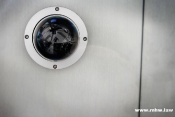On January 1, 2016, the Authorized Electronic Monitoring in Long-Term Care Facilities Act became law in Illinois. This law allows audio and/or video recording devices to be placed in nursing home rooms to monitor care provided that permission is granted by the resident. The abuse and neglect of nursing home residents remains a persistent problem in Illinois. In 2014, Illinois Nursing Homes earned an average score of “F” as handed out by watchdog group “Families for Better Care”.
Benefits
Families of nursing home residents often worry about the quality of care provided to their loved ones in between visits. This statute allows families the opportunity to legally monitor the care being received. Any abuse or neglect of the nursing home resident would be captured on film. Presumably, this will improve both the quality of care provided and reduce the potential for mistreatment due to awareness of the monitoring.
The cost of camera placement in the facility is the financial responsibility of the family.
Concerns
Obviously, if the resident and family member agree, this is a great opportunity for monitoring what takes place on a day-day basis. But what of the cases where a family requests it but the elder feels their privacy is being violated? While they may welcome the protection benefits, the resident may have concerns about dignity.
There is a delicate balance to strike when it comes to conversations around placing cameras in long-term care rooms. A family must always keep in mind the concerns their loved one may have, and consider all sides during this decision making process.
There are 19,000 abuse cases recorded each year in Illinois. Mitchell Hoffman and Wolf has handled many nursing home cases with success. If you have any concerns about the treatment of your loved one, or would like to discuss this topic, please don’t hesitate to contact us.

